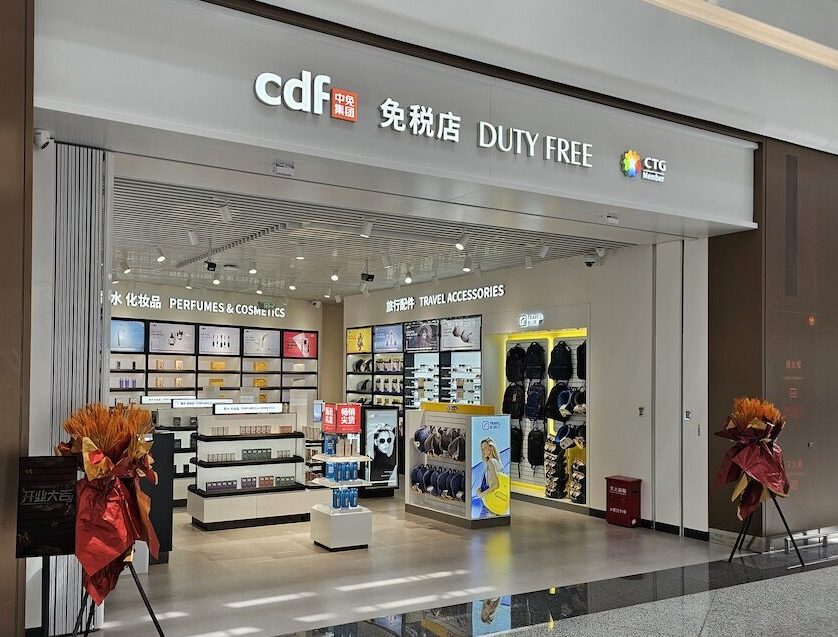6 February
Our coverage has now moved to a new page. Click here for the latest updates
Japan
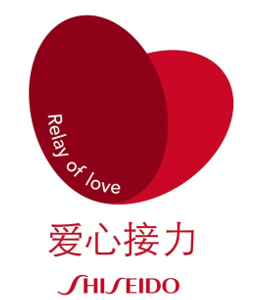
Shiseido Group has responded to the novel coronavirus outbreak with a strong showing of practical support.
The Japanese beauty company — whose travel retail business remains its fastest-growing division, according to group results released today — has expressed its deepest condolences and sympathies to those whom the virus has affected.
In the wake of the outbreak, Shiseido Group has announced its Relay of Love Project which aims to support the victims and the regions most affected by the novel coronavirus.
The project will allocate 1% of Shiseido Group’s sales in Asian markets (between February and July this year) as in-house funds to support various charitable activities.
According to the company, these activities include the donation of utility products and supplies from Shiseido Group to areas in need, donations to charities that support the restoration of victims’ lives, and the invigoration of people through ‘the power of beauty.’
In addition to the Relay of Love Project, Shiseido Group has also donated CNY1 million (US$143,000) to the Charity Federation of Wuhan; and donated CNY10 million (US$1.43 million) to the Shanghai Charity Foundation. The funds will help with medical treatment and infection prevention in affected areas.
In the statement, the company said: “Shiseido would like to express its deepest condolences to those who have suffered loss from the novel coronavirus, and sympathy to all whom it has affected. We sincerely wish for the situation to get well soon.”
International
Several giants of the beauty industry have unveiled their quarterly results over the past two days, each offering important insights into how the coronavirus crisis is affecting – or likely to affect – their business.
Underlining just how quickly things can change in business, The Estée Lauder Companies today unveiled what CEO Fabrizio Freda described as “superb” second-quarter results while proceeding to warn that the company was updating its fiscal year outlook due to the health crisis.
The third quarter is anticipated to be the most negatively impacted with sales declining versus the prior-year period, the company said. It added: “Global travel retail, localities most affected by the virus outbreak and destination markets favoured by tourists are expected to experience the greatest negative impact in the coming months followed by a gradual recovery later in the fiscal year. The company stands ready to facilitate the recovery as soon as the market dynamics support it.” Read more here
Japanese beauty giant Shiseido also commented today on the outbreak as it released strong 2019 results, driven by an outstanding showing by its travel retail arm – the group’s fastest-growing division.
Whereas the Chinese domestic market grew by +47% year-on-year (for the four brands Shiseido, Clé de Peau Beauté, NARS and Elixir) between 1-23 January, it contracted by -55% from 24-30 January as the virus began to take an increased human and market toll. Japan – Shiseido’s biggest market – had negative growth over the same periods of -3% and -16% respectively. Travel retail in Japan was more resilient with year-on-year increases of +25% and +13% over the two periods, although contraction began in early February (see chart below).

Coty, whose portfolio is more fragrance-orientated than major rivals such as Lauder and L’Oréal (also releasing today) said that while it would take a hit from the coronavirus, any impact would be less significant than for its competitors. China accounts for just 3% of the company’s overall sales. Read more here
Singapore
The Tax Free World Association (TFWA) said that it is “continuing as planned with its preparations for the TFWA Asia Pacific Exhibition & Conference” due to take place in Singapore in May.
A pop-up that appears when opening the association’s website says: “In light of the recent coronavirus outbreak, TFWA will follow recommended guidelines from local and international organisations in planning the event.
“TFWA is closely monitoring the situation and is liaising with authorities in Singapore as well as other relevant bodies, and will take appropriate action in the interests of the industry as and when necessary.
“We remain optimistic that the effects of the current outbreak will be short term, and we believe it is important to be ready for business to resume as quickly as possible once the immediate issues have been resolved.”
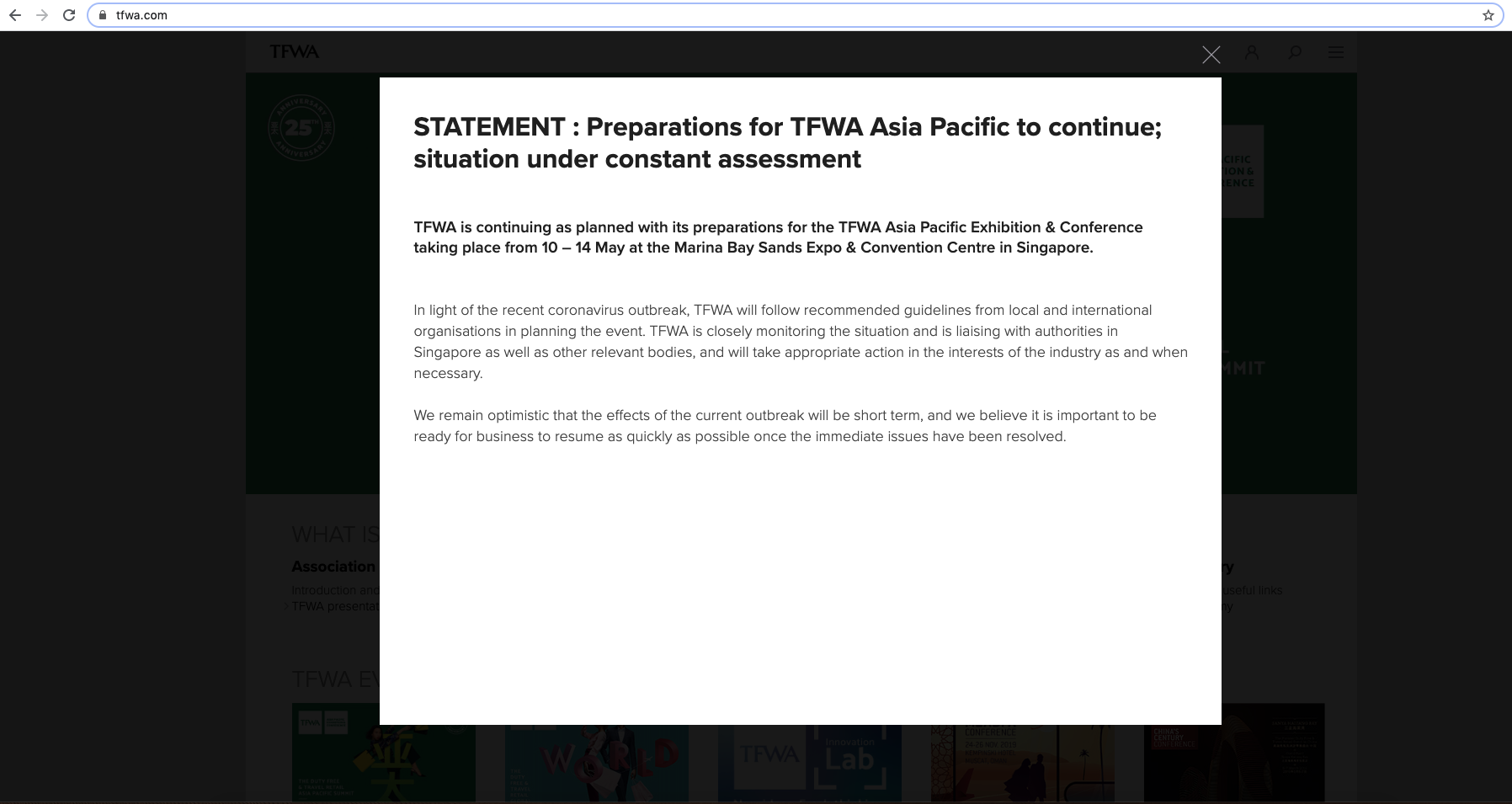
In the wake of the SARS outbreak in 2003, the association cancelled that year’s TFWA Asia Pacific Exhibition & Conference.
Asia Pacific
The Pacific Asia Travel Association (PATA) today hosted a webinar to examine the effects of the coronavirus on travel markets. It examined how the travel and tourism industry in Asia Pacific in particular can mitigate against the impact of the downturn in outbound China traffic.
A key message from panellists (PATA CEO Dr. Mario Hardy, travel analyst ForwardKeys President – Insights Olivier Ponti and travel research firm Twenty31 Consulting Partner Oliver Martin) was the need to rebalance the tourism business from its recent heavy reliance on Chinese outbound travel.
Martin said: “We have been lucky in the Chinese outbound market growth but have become so reliant on that market at the expense of not doing things differently or balancing our portfolio of geographic markets. We have to do this so we are not beholden to the impact of one crisis.”
Hardy added: “It is critical that destinations do not just rely on one source market but have a balanced portfolio. This should be a wake-up call to anyone in tourism that we need balance in our source markets.
He said that China and Chinese companies also needed support from tourism and business partners worldwide. “China will still be critical in the recovery. What we need to do as an industry is to pay attention to our business partner in China and provide assistance to them. They are suffering the most here. For business who trade with China, can they offer refunds or letters of credit or other measures so we can maintain these very important relationships for the future?”
Click here for the full story.
Taiwan
The Central Epidemic Command Center (CECC) has announced all international cruise ships will be banned from calling at ports of Taiwan from today.
The news comes after 20 people, including one passenger from Taiwan, on the Diamond Princess ship in Japan tested positive for the coronavirus.
The Centers for Disease Control and Ministry of Health & Welfare in Taiwan have also extended travel restrictions to the island. The entry of all Chinese residents will be suspended, and all travellers from Mainland China, Hong Kong and Macau are required to be under home quarantine when entering Taiwan.
Australia/China (Hong Kong)
Virgin Australia will withdraw its services between Australia and Hong Kong after the airline conducted a comprehensive review and concluded it is no longer commercially viable to fly to the special administrative region.
Virgin Australia Group Chief Commercial Officer John Macleod said: “Hong Kong has continued to be a challenging market. With a decline in demand following ongoing civil unrest and growing concerns over the coronavirus outbreak in the wider region, we have made the decision to withdraw services.”
The previously-announced suspension of the airline’s Melbourne to Hong Kong Service will take effect from 11 February, and its Sydney to Hong Kong operations will cease from 2 March.
China/Thailand
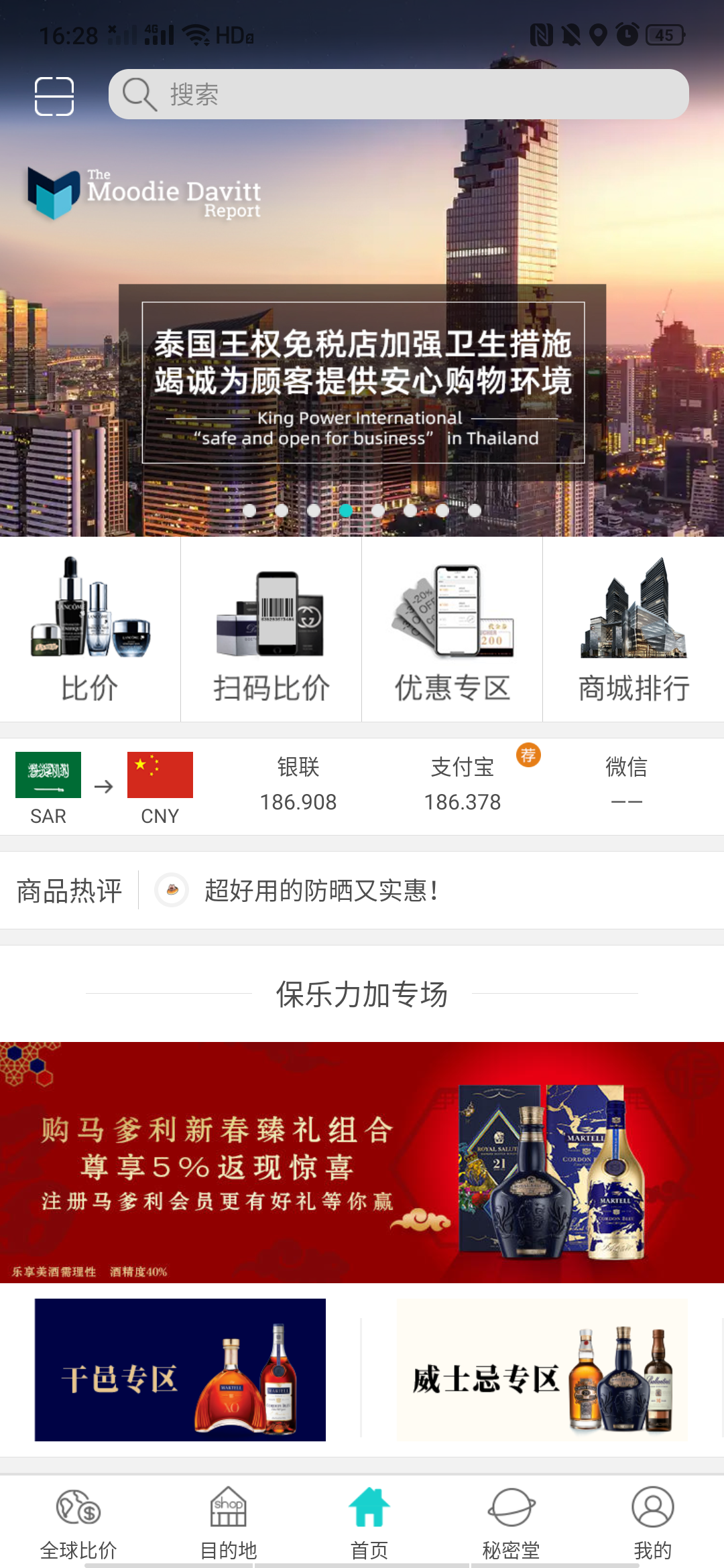 The Moodie Davitt Report’s close Chinese partner Jessica’s Secret has joined our public efforts to support King Power International’s business in Thailand, which has been hit by a meltdown of Chinese group tour business. King Power, Thailand’s leading travel retailer, yesterday issued a statement to all nationalities and tour agencies through The Moodie Davitt Report emphasising that the company’s downtown stores in Bangkok, Phuket and Pattaya, as well as its airport shops, are safe and fully open for business.
The Moodie Davitt Report’s close Chinese partner Jessica’s Secret has joined our public efforts to support King Power International’s business in Thailand, which has been hit by a meltdown of Chinese group tour business. King Power, Thailand’s leading travel retailer, yesterday issued a statement to all nationalities and tour agencies through The Moodie Davitt Report emphasising that the company’s downtown stores in Bangkok, Phuket and Pattaya, as well as its airport shops, are safe and fully open for business.
Group tour business into the downtown stores (which usually runs at about 10,000 visitors a day) has come to a complete halt in recent days due to concerns over the coronavirus. But King Power says its shops have impeccable health standards and has encouraged Chinese tourists and all other travellers to return.
Jessica’s Secret, a hugely popular app-based platform for Chinese consumers, today published our article in Chinese, as a statement of solidarity with King Power International, a company it already works with closely.

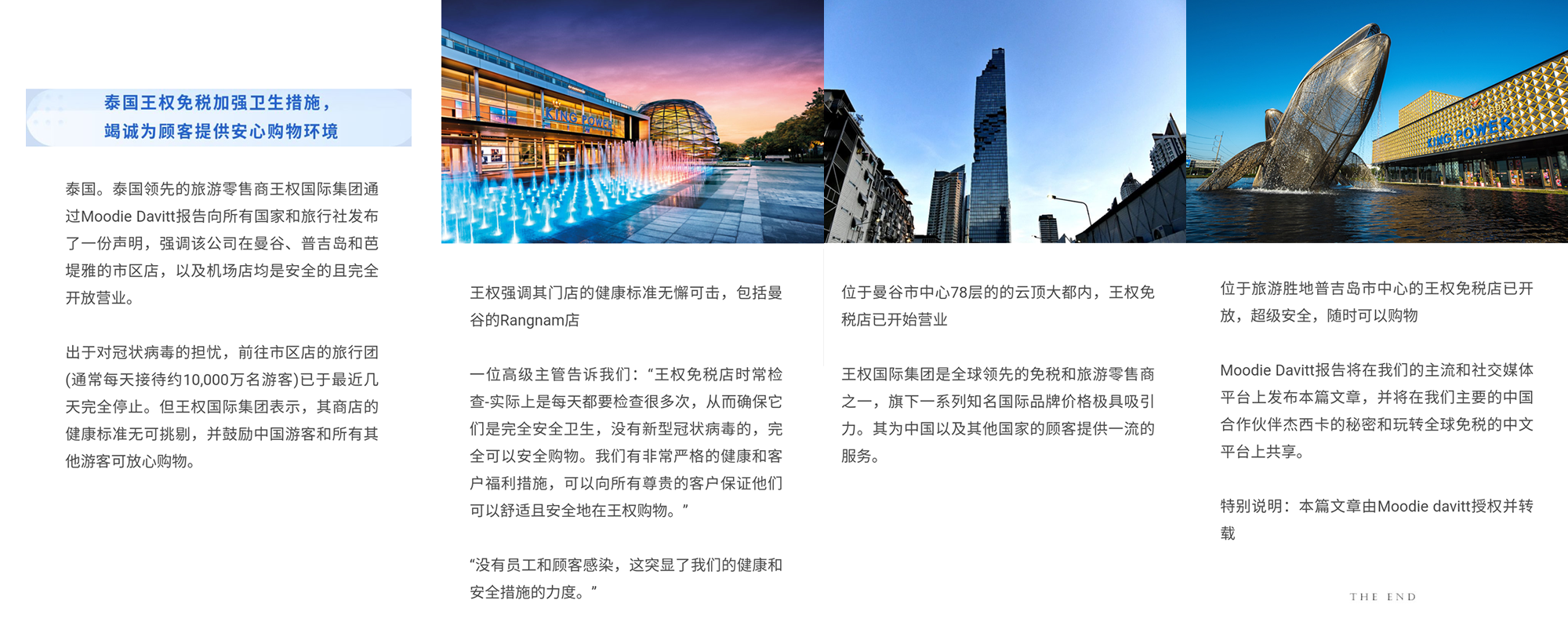
Japan
Ten more passengers on cruise ship Diamond Princess have tested positive for the novel coronavirus, taking the total number to 20. More than 3,700 people on board have been quarantined for 14 days.
As we noted yesterday, Princess Cruises has confirmed the cancellation of the cruises on Diamond Princess that were due to set sail on 4 February and 12 February.
As reported, MSC Cruises Head of Retail Adrian Pittaway had warned of the impact the coronavirus outbreak would have on the Chinese cruise retail industry. “We must pay attention to the significant effect this will have for us in the cruise retail sector. As of last week, the entire outbound Chinese mainland cruise market has been suspended and there are currently no cruises operating from China,” he said.
China
In its up-to-the-minute reporting on the coronavirus, Chinese state-owned media Global Times says that 3,694 new confirmed cases were reported on 5 February in the Chinese mainland, citing the National Health Commission. The total number infected globally has now climbed to 28,296, with 565 deaths.
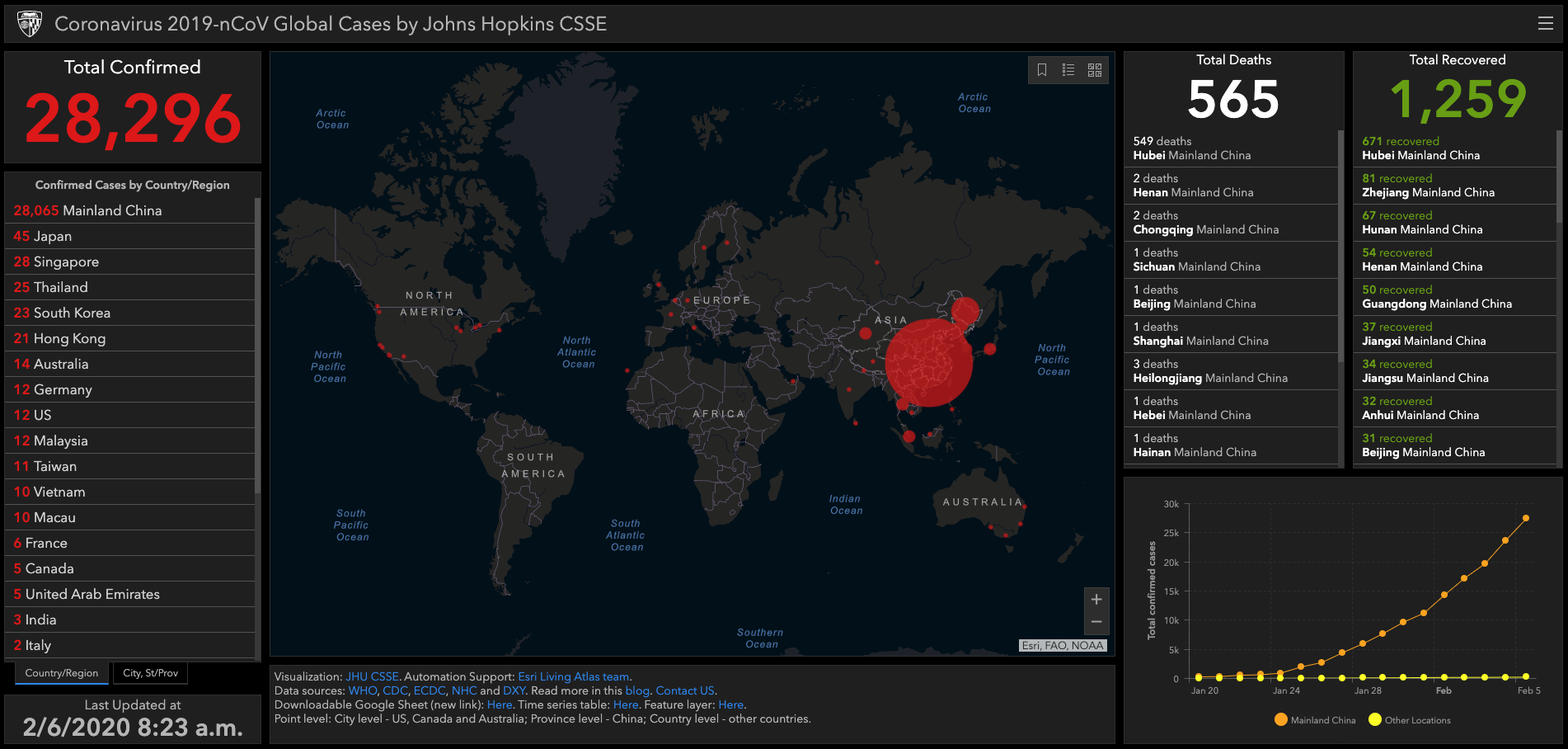
5 February
International
The Moodie Davitt Report today hosted a phone-in audience with Dr. David Heymann, Professor of Infectious Disease Epidemiology at the London School of Hygiene & Tropical Medicine and Head of the Centre on Global Health Security at Chatham House, London.
“There are several factors required to understand this outbreak,” Dr Heymann said. “That includes the transmissibility – the ability of the virus to spread from person to person; it includes the way the virus is transmitted from person to person and the third factor that is not understood is the severity of the infection.”
Read edited highlights from the discussion here
Thailand
King Power International has issued a statement to all nationalities and tour agencies through The Moodie Davitt Report emphasising that the company’s downtown stores in Bangkok, Phuket and Pattaya, as well as its airport shops, are safe and fully open for business.
A senior executive told us, “The King Power stores are checked constantly – many times each day in fact – to ensure they are fully hygienic, free from the novel coronavirus, and totally safe to shop.”

Japan
Ten people have tested positive for the coronavirus on the cruise ship Diamond Princess. They include two Australians, three Japanese, three from Hong Kong, one American and a Filipino crew member.
This comes after the 3,500-plus people onboard were tested for the coronavirus following the revelation that a former passenger on the vessel had contracted the illness.
The ten people who have tested positive are being taken ashore to be cared for by Japanese medical professionals. The ship and the remaining passengers will remain in quarantine in the port of Yokohama for at least 14 days.
Princess Cruises has confirmed the cancellation of the cruises on Diamond Princess that were due to set sail on 4 February and 12 February.
As reported, MSC Cruises Head of Retail Adrian Pittaway had warned of the impact the coronavirus outbreak would have on the Chinese cruise retail industry. “We must pay attention to the significant effect this will have for us in the cruise retail sector. As of last week, the entire outbound Chinese mainland cruise market has been suspended and there are currently no cruises operating from China,” he said.
South Korea
In welcome news, The Shilla Duty Free has decided to resume its Seoul and Jeju downtown operations from Friday 7 February. As reported, the stores were closed temporarily to allow professional quarantine disinfection.
The Shilla Duty Free first announced a temporary shutdown of its flagship Seoul store on 2 February after receiving a notification that a customer, later confirmed with the novel coronavirus, had visited the shop in January.

The Jeju store was closed the same day following the Jeju provincial government’s announcement that a Chinese customer had been confirmed with the coronavirus after returning home.
During the temporary closure, The Shilla Duty Free has actively cooperated with the health authorities in epidemiological investigations and thoroughly disinfected all the facilities and supplies of the stores, the company noted.
The Korea Centers for Disease Control and Prevention announced, “Coronavirus that escapes from the human body dies within hours of exposure to the atmosphere, and the places where the confirmed patient visited are safe after proper disinfection measures were completed.”
A spokesperson for The Shilla Duty Free said, “The Shilla Duty Free place top priority on the safety and health of customers and employees and will continue to cooperate with relevant authorities to prevent infections and do our best to carry out quarantine activities.”
Meanwhile, The Shilla Duty Free will temporarily change its business hours to the following.
※ Temporary change of business hours (From 7 February until further notice)
- Seoul Store 09:00~18:00
- Jeju Downtown Store 09:30~18:30
Shilla Duty Free’s notification means that the Seoul store will close 2 hours and 30 minutes earlier than before and the Jeju store 30 minutes earlier. Previously the Seoul store operated from 09:00 to 20:30 and the Jeju store was open between 09:00 and 19:00.
Similar measures have been implemented by other duty free operators with Lotte Duty Free announcing a store operation hours change from yesterday, 4 February.
UPDATE: Lotte Duty Free has just confirmed to the Moodie Davitt Report that the Lotte Duty Free Jeju store will resume operations on 7 February.
China
Important news from the admirable state media Global Times this morning local time, summarised here:

- Let us never, never forget the human cost of this crisis. He Hui, a 54-year-old volunteer in Wuhan, died yesterday because of the novel coronavirus infection. He served as a volunteer driver picking up medical staff in the city. Chinese netizens mourned his death on Sina Weibo.
- 3,156 new cases of novel coronavirus, 65 new deaths and 125 recovered patients were reported in Hubei Province yesterday. Total infection numbers rose to 16,678, with 520 recovered and 479 dead in the province.
- A total of 24,324 cases of novel coronavirus were confirmed on the Chinese mainland as of Tuesday, with 490 deaths, said the National Health Commission.
- The average age of patients who have died of novel coronavirus-related conditions in Wuhan is 68.
- Important words too from the Chinese Foreign Ministry, which pointed out that the mortality rate of the coronavirus outbreak China-wide as of Monday night was about 2.1%, much lower than previous epidemics, including 17.4% for 2009 H1N1 influenza which originated in the US and 34.4% for Middle East Respiratory Syndrome (MERS). Since Saturday more people have been recovering from the disease than dying from it, Chinese Foreign Ministry spokesperson Hua Chunying said during an online media briefing yesterday. However, the fatality rate of confirmed novel coronavirus cases in Wuhan was 4.9%, due to early treatment capacity being way below demand.
- The Ministry also reiterated the World Health Organization’s advice to refrain from rumour-mongering, saying that the virus is terrible, but rumors and panic are even more terrifying. WHO has called on countries to take convincing measures based on facts and China has adopted unprecedented control mechanisms, the Foreign Ministry added.

4 February
International
The World Health Organization (WHO) today said that the outbreak of the novel coronavirus does not yet constitute a pandemic. A pandemic is a worldwide spread of a new disease, according to WHO.
Sylvie Briand, head of WHO’s Global Infectious Hazard Preparedness division, told a press conference in Geneva: “Currently we are not in a pandemic. We are at the phase where it is an epidemic with multiple foci. We will try to extinguish its transmission in each of these foci.”
She added that despite speculation that the virus was changing and mutating, the evidence to date suggested it was “quite stable”.

Japan
The 2,666 passengers and 1,045 crew members coming to the end of the 16-day voyage on Diamond Princess will need to remain on the ship overnight in the port of Yokohama after it was revealed a former passenger on the vessel has contracted the coronavirus.
Princess Cruises said that a passenger who had disembarked the ship in Hong Kong on 25 January had since tested positive for the coronavirus. As a precaution, Japanese health authorities are checking the health of all passengers and cruise members before letting them leave the ship.
This comes after 6,000 people were kept on the Costa Smeralda ship in Italy while tests were conducted on a passenger showing symptoms. The 54-year-old woman ultimately tested negative and passengers were able to disembark the ship.
As reported, MSC Cruises Head of Retail Adrian Pittaway has warned of the “significant effect” the coronavirus outbreak will have on the Chinese cruise retail sector.
Macau
Macau is to suspend gaming and related entertainment for the next two weeks to prevent the spread of the coronavirus, the territory’s Chief Executive Ho Iat-seng said today. Macau has recorded ten cases of the outbreak to date. Ho said that the measures could be extended if the situation worsens. He did not rule out the possibility of border crossings between Macau and Zhuhai.
The closure of gaming operations comes as a further blow to the duty free sector, whose fortunes are closely linked to those of the casino business and which has already been hit hard by the sharp fall in Macau arrivals.
One downtown duty free retailer told The Moodie Davitt Report that sales were down by as much as -75% during the period.
DFS Group’s stores are still open, The Moodie Davitt Report can confirm.
Visitor numbers to Macau plunged -78.3% year-on-year during the Lunar New Year holiday, according to data from Macau Government Tourist Office.

According to preliminary statistics, Macau welcomed around 260,000 visitor arrivals (non-resident employees and students excluded) during the seven-day Spring Festival Golden Week (24 to 30 January).
Visitors from Greater China decreased by -79.4% year-on-year to 235,000, and accounted for 90.1% of total visitor arrivals. Among these, 149,000 visitors came from Mainland China, accounting for 57.2% of total visitor arrivals, a drop of -83.3%. The number of Hong Kong visitors reached 76,000, down -66.7%, and visitor arrivals from the Taiwan region fell by -53.5% to 10,000. Meanwhile, international visitor arrivals dropped by -56.2% year-on-year to 26,000.
Industry figures revealed that hotels and guest houses registered an average occupancy rate of 52.9% during the week, down by 43.8% compared to last year.

South Korea
Normally South Korea – the world’s biggest duty free market – would be celebrating news of a record year in sales, writes Martin Moodie.
As we reported yesterday, duty free sales in 2019 leapt by +23.7% year-on-year to a record US$21.32 billion (KRW24.86 trillion).

But there’s no mood of celebration among Korean travel retailers today. They know what they have known for several years – that the market is overwhelmingly reliant on one nationality, the Chinese. If anything happens to disrupt or stem that source market, then the repercussions are potentially frightening.
But it’s not straightforward. When the South Korean and Chinese governments became embroiled in a major dispute in early 2017 over the former’s deployment of the US anti-missile system THAAD, many predicted disaster for Korean travel retail. Chinese visitor numbers (46.8% of total arrivals in 2016) went into freefall, spurred by the banning of group tours from the Mainland.
Despite a -48.3% slump in Chinese visitors that year, the duty free market actually grew by +20.7% to a record US$12.8 billion. And despite the continued absence of group tourists, it has kept on growing ever since, rising by an extraordinary +67% in two years.

The reason was simple. A flourishing daigou or shuttle trader business. There may not have been traditional tourist demand (or supply) from the Mainland but – driven by the huge price disparity between Korean duty free and China local market – there was immense product demand across the vast Chinese nation.
Consequently, it is the daigou business that underpins the record numbers we reported yesterday. Sales to foreigners (principally Chinese and principally Daigou) increased by +30.9% year-on-year to US$17.84 billion (KRW20.81 trillion), which more than compensated for a decline in spend among Koreans (-3.5% to US$3.49 billion/KRW4.05 trillion).
The Moodie Davitt Report Senior Retail and Commercial Analyst Min Yong Jung is a Korean national who has covered the daigou sector closely as part of his analysis of the country’s beauty and travel retail channels. “The resellers don’t appear to be phased,” he commented. “For now, they look to have moved a bulk of their purchases from cosmetics to mask packs.
“Resellers are not scared off easily and they will be back. The duty free stores will however see a short-term impact. With the MERS (Middle East Respiratory Syndrome), which hit Korea badly from May to July 2015, sales recovered in just three months following the end of the outbreak.”

Jung continued: “The daigou are not easily phased and people don’t doubt if they will return but question when. Since 2016, duty free sales in Korea have also structurally changed with large-scale resellers accounting for the majority of the market in 2019. This should help to expedite a sales recovery as corporate resellers are incentivised to return to Korean duty free as long as the arbitrage trade opportunity is still there.

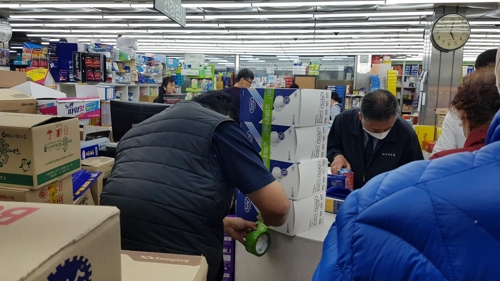
“The negative to the fast recovery scenario would be that MERS never really impacted China and demand for goods from overseas was unimpacted. The key question with the comparison between MERS and SARS is how will Chinese consumers who demand goods from resellers in Korea recover after the coronavirus?
“Data of recovery in air passenger traffic in China suggests negative impacts are short lived. Air traffic immediately recovered in 2004 after SARS, supporting the conclusion that the negative impact will be short-lived if the virus can be got under control.”
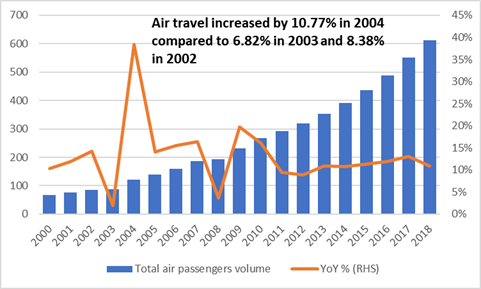
Hong Kong
Hong Kong health officials confirm the first death related to coronavirus in the territory. It is the second death outside Mainland China, after the first was confirmed in the Philippines on Sunday.
China
State-controlled Global Times has done an outstanding job in reporting the coronavirus outbreak, offering constantly updated figures, facts and commentary. At 07.55 today Beijing time, it noted that 3,235 confirmed cases had been newly reported by the end of 3 February, and that the total number of cases on the Mainland had risen to 20,438. The death toll is now up to 425.

3 February
China
The numbers tell their own stark story. 12.62 million passenger trips by railways, roads, waterways and air were made on Sunday, 2 January, down -86.3% from the same day last year, according to the Ministry of Transport. [Source: Global Times]
Asia
Several leading beauty houses have cancelled major travel retail events and activations over coming months, some as far out as June, The Moodie Davitt Report has learned. With the trade shut down at CDF Mall in Haitang Bay – the biggest door for many travel retail suppliers – and locations such as Macau, Hong Kong and Thailand in freefall, it is no time for such brand activities or perceived celebration, one leading beauty company executive told The Moodie Davitt Report.
All parties spoken to by The Moodie Davitt Report this week accept that the commercial impact of the coronavirus crisis will be severe. The big question now is how long will it last. One month would be a good result, three months (more likely) tolerable, one executive told us. Six months would prove deeply problematic and one year “would change everything”.
Beauty has been the locomotive of travel retail growth in recent years, driven by its importance to the travelling Chinese. For now at least, that locomotive has stalled.
China
Underlining the high-level commitment to ending the health crisis, Chinese leader Xi Jinping today presided over a meeting of the Political Bureau of the Communist Party of China (CPC) Central Committee to study and strengthen the prevention and control of novel coronavirus. [Source: Global Times]
International
MSC Cruises Head of Retail Adrian Pittaway has talked of the “significant effect” the outbreak will have on the cruise retail sector.
“Cruise retailing in China is one of our most important and highest growth markets as an industry, with strong operations across the different cruise ships operating out of the country and onboard retailing a key reason to go cruising. Chinese travellers are now the second biggest source market of cruise passengers globally. That means any external crisis, such as the coronavirus, will have significant implications for us, as a channel,” he says.
China
Some 25,000 fewer flights will operate to and from China this week compared to two weeks ago as a result of cancellations due to the coronavirus, according to flight schedule analyst OAG. That translates to a loss of around 4.4 million seats across domestic and international routes – the equivalent of the entire Indian market, according to OAG. Click here for the full story.
Hong Kong
Hong Kong Chief Executive Carrie Lam today announced the closure, effective Tuesday, of a further four border crossings with China, including Lok Ma Chau and Luohu, in a bid to contain the spread of the coronavirus. Crossings at Shenzhen Bay and the Hong Kong-Zhuhai-Macau bridge will remain open, she added.
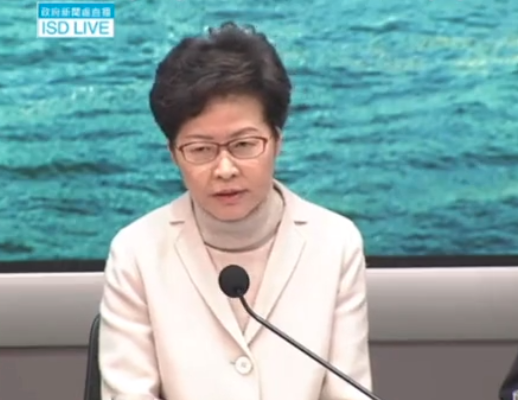
Hong Kong International Airport will remain open for Mainland Chinese, though there are restrictions on arrivals from Hubei Province. The latest closures follow several last week (including high speed rail and ferries) and will allow officials to focus on a limited number of land border crossings as well as the airport in efforts to restrict the spread of the outbreak.
“After we introduce these measures, there will be a substantial reduction in movements,” Lam told a press conference today. “From 13 control border points, we have closed ten.”
“If necessary we will implement further measures,” she added. “These may include requiring all people crossing the border to go into quarantine. Currently this only affects people coming from Hubei Province but if we need to step up measures, we will.”
China
The Shanghai Stock Exchange plunged -8.9% at the opening of trading after the Lunar New Year holiday today, as investors reacted to the coronavirus spread, but later gained ground to close down -7.7%.
It follows a week of trading losses at major international exchanges. Among benchmark indexes closely followed by the Moodie Davitt Business Intelligence Unit, the biggest fallers between 24 and 31 January were the Hang Seng Index (Hong Kong), down -5.9%, KOSPI Index (Korea) -5.7% and PSEI Index (Philippines) -5.5%.
The Moodie Davitt Report Senior Retail and Commercial Analyst Min Yong Jung has been examining the impact of the coronavirus outbreak on stock markets and key shares. For his latest analysis, click here.
South Korea
The Shilla Duty Free has temporarily closed its downtown stores in Seoul and Jeju in response to the worsening coronavirus situation, The Moodie Davitt Report can confirm. Local reports say that a coronavirus-infected person was confirmed to have visited the Seoul flagship twice last month. [Source: Yonhap News].
“Sales have slumped in recent days as the situation has worsened,” a Korean travel retail veteran told The Moodie Davitt Report from Seoul this morning.



A Lotte Duty Free spokesperson told The Moodie Davitt Report this afternoon Seoul time: “We are running other [non-Jeju] stores just fine, but we are experiencing a sales downturn. For the Lunar New Year break, Lotte Duty Free recorded a -30% year-on-year fall in average daily sales at our three Seoul downtown stores. Comparing to the same period in the previous week, Lotte posted a -30% fall as well.
“It will last way longer than we expected… things are not so good.”
The economic impact from the closure of Shilla’s stores in Seoul and Jeju and Lotte’s Jeju store will be heavy, writes The Moodie Davitt Report Senior Retail and Commercial Analyst Min Yong Jung.
2018 annual sales by store:
- Shilla Seoul KRW2,884 billion (US$2,620 million)
- Shilla Jeju KRW868 billion (US$788 million)
- Lotte Jeju KRW754 billion (US$685 million)
2018 average daily sales*:
- Shilla Seoul KRW7.9 billion (US$7.2 million)
- Shilla Jeju KRW2.4 billion (US$2.2 million)
- Lotte Jeju KRW2.1 billion (US$1.9 million)
[* annual sales divided by 365 days]
“Assuming stores are closed for 14 days, the economic impact from store closures (average daily sales multiplied by # of days stores are closed for) could be KRW172.8 billion (US$157.0 million),” said Jung.
Potential losses over a 14-day period
- Shilla Seoul KRW110.6 billion (US$100.5 million)
- Shilla Jeju KRW33.3 billion (US$30.2 million)
- Lotte Jeju KRW28.9 billion (US$26.3 million)
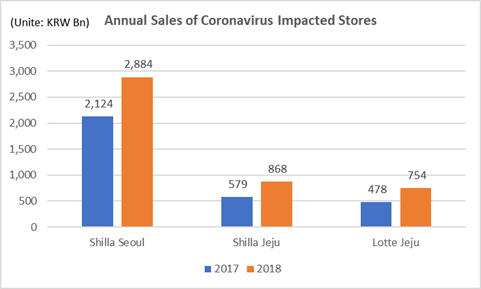
Asia Pacific
The Association of Asia Pacific Airlines (AAPA) has said its already uncertain outlook for air travel in the region in 2020 has been further impacted by the coronavirus outbreak.
AAPA Director General Andrew Herdman said: “The recent 2019-nCoV coronavirus outbreak has now been categorised by the World Health Organization as a Public Health Emergency of International Concern. The related imposition of travel restrictions and widespread public concern has led to significant falls in demand for air travel on routes to/from and within China, and corresponding adjustments to airline schedules.
“Airlines continue to closely monitor further developments, and are operating in accordance with established standards and practices developed in conjunction with public health authorities regarding outbreaks of communicable diseases.”
China
2,829 new cases of coronavirus were reported in China yesterday (2 February), bringing the total number of infected cases to 17,205.The death toll hit 362.

2 February
Philippines
The Philippines today reported its first death from the novel coronavirus, the first fatality outside China.
International
Hotels, luxury shops and other attractions and destinations that are heavily reliant on Chinese tourists face an even bigger crisis than during the SARS outbreak of 2003, according to a Bloomberg report.
“From Tokyo to London, hotels, casinos, airlines and retailers are already recording a downturn and are bracing for weeks, if not months, of plummeting spending after China curbed outbound travel and governments tightened border controls,” the news agency reported.
“The benchmark everyone is comparing this to is SARS in 2003” –Luya You, Bocom International Analyst

In fact the impact could be much greater. As reported by The Moodie Davitt Senior Retail and Commercial Analyst Min Yong Jung, total air passenger traffic by Chinese has grown exponentially since 2002, the year before the SARS crisis peaked. Since then the Chinese spend has become the engine room of growth for travel retail worldwide, generating over 70% of sales in the world’s biggest duty free market, South Korea, alone.

“It’s a triple whammy – Chinese travel more, they spend more and they spend more on beauty products,” Jefferies LLC consumer analyst Stephanie Wissink told Bloomberg. “Chinese travellers are the most significant and most important customers for growth in the travel retail industry.”
“The benchmark everyone is comparing this to is SARS in 2003,” said Luya You, a Hong Kong-based transportation analyst at Bocom International. “The actual cost and negative impact of this virus could be greater because more Chinese are travelling than before. The cost of preventing travel, grounding flights is magnitudes higher than what it was in 2003.”

China
As of midnight Saturday Beijing time, the coronavirus death toll had reached 304. Encouragingly, 328 people have been cured and discharged from hospital. The number of suspected cases in China stood at 19,544 with 14,380 cases confirmed.
South Korea
Lotte Duty Free has today announced the temporary closure of its Jeju downtown duty free store from tomorrow in order to prevent the spread of the coronavirus domestically.
The measure is necessary “for the safety of customers and employees”, Lotte said.
Lotte Duty Free confirmed that a Chinese customer who visited the store on 23 January and later returned to Yangzhou, China, had been confirmed subsequently with the coronavirus.

Until the closure, no new customers are being allowed into the store today and customers already in the store are being asked to leave.
Lotte Duty Free Jeju will carry out additional quarantine work after the store is closed. The retailer will decide when to reopen after consultation with the health authorities and Jeju Special Self-Governing Province.
A company spokesperson said: “We decided to close the business quickly on a temporary basis to prevent the spread of the new coronavirus in Korea.”
As reported, Lotte Duty Free formed an emergency response committee on 24 January with CEO Kap Lee as Chairman. The retailer is conducting thorough health inspections at stores, implementing a self-disinfecting policy at least six times a day; obliging all employees to wear masks and providing customers with masks.
1 February
China
Song Guoyou, Deputy Director of the Center for American Studies at Fudan University, has slammed US Secretary of Commerce Wilbur Ross’s claim, made Thursday, that the coronavirus would help accelerate the return of jobs to the US.
“It’s hard to believe that such immoral remarks were made by a US Commerce Secretary,” Song wrote in a hard-hitting opinion piece in state-controlled Chinese state media Global Times.
“There is no boundary for this epidemic. The novel coronavirus is the common enemy of mankind.”
“Basic compassion and morality are the yardsticks of human behaviour,” he wrote. “But Ross’s comments show that extreme selfishness seems to have dominated his mindset and values. He is so cold-blooded that he has ignored diplomatic etiquette, taking the public health epidemic that a country with 1.4 billion people is grappling with as an opportunity to realize American interests.”

He continued: “The H1N1 influenza pandemic, known as swine flu, that first broke out in the US in 2009, was also declared by the World Health Organization (WHO) as a public health emergency of international concern. Scientists estimated that the flu pandemic that swept more than 200 countries and regions killed about 280,000 people worldwide.
“In the US, the influenza virus led to the deaths of an estimated 10,000 people. Imagine if a Chinese senior official had said the swine flu would hit the US economy and accelerate the flow of global investment into China when the US was combating the virus, what would Americans and international society have thought? The only thing Ross cares about amid the novel coronavirus outbreak is the return of manufacturing to the US. He is too narrow-minded.
“There is no boundary for this epidemic. The novel coronavirus is the common enemy of mankind. As the commerce secretary of the world’s most powerful economy, instead of exploiting China’s crisis, Ross should fairly appraise the efforts made by the Chinese government in fighting the coronavirus.”
China
Chinese authorities confirm 11,791 cases of novel coronavirus in the country, with 259 deaths and importantly, 243 people confirmed to have recovered. [Source: Global Times]
“The WHO declaration is understandable. How China’s battle against the novel coronavirus goes and what trajectory the Chinese economy will head this year are determined by China’s own efforts. As long as we can put the epidemic under control, many problems will be solved. The WHO’s declaration will not become a major hurdle for China to make up for its current losses.
“It is possible that some countries would use the WHO declaration as a lever to overreact to the current virus outbreak in China. But still, as long as China contains the epidemic, the situation will improve. Most countries and world organizations have no reason to find fault with China over the epidemic after it is effectively contained, because they will only end up suffering losses if they do so.
“We have to concentrate on fighting the epidemic. While China has left a lot of room for improvement, from an outside perspective, China’s public health battle this time has been resolute and orderly. It is hoped that our efforts can effectively curb the epidemic so that China can hold more initiatives in world affairs this year.”
– Edited highlights from an editorial in Chinese state media Global Times, 31 January
31 January
International
As part of our continuing service to update the travel retail community on the novel coronavirus outbreak and its impact on business, we are pleased to announce a phone-in audience with Dr David Heymann on Wednesday (5 February) at 9am (GMT).
From 2012 to March 2017, Dr Heymann was chairman of Public Health England. Earlier in his distinguished career, he was Executive Director of the Communicable Diseases Cluster, and headed the global response to SARS in 2003.
For more information on how to get involved with the free event, click here.
Russia
Russia today reported its first two cases of the coronavirus, report Reuters and official Russian news agencies. Both are Chinese citizens, who were diagnosed in the Siberian regions of Tyumen and Zabaikalsky Krai respectively.
Deputy Prime Minister Tatiana Golikova said that Russian airlines will halt flights to China from midnight tonight, although the national carrier Aeroflot plans to continue. It has offered passengers the option of rebooking or a refund, but has not yet cancelled flights.
Russia has closed its 4,300km land border with China to try to protect against the spread of the outbreak.
China (Macau)
Following our earlier report that arrivals in Macau had dropped -69% in the first four days of the Lunar New Year period, we can now confirm that total arrivals for the Lunar New Year week plummeted -78.3%.

During the Lunar New Year week (24 January to 30 January inclusive), arrivals from Mainland China were down -83.3% compared to the equivalent period in 2019 (4 February to 10 February inclusive).
The drop off in arrivals was particularly pronounced over recent days. Arrivals in Macau from Mainland China declined by over -90% on each of the last three days of the Lunar New Year week compared to the equivalent period a year earlier.

Macau Daily Times reports that the novel coronavirus will particularly impact the cash flow of Macau’s gaming industry, a sector inextricably linked to the special administrative region’s duty free operations.
China
Authorities say 9,692 cases of the new coronavirus pneumonia have been confirmed, leading to 213 deaths. The number of confirmed cases is now higher than the 8,098 seen during the SARS outbreak in 2003.
China is “confident in and capable of” effectively containing the novel coronavirus epidemic, and eventually defeating it, the National Health Commission of the People’s Republic of China said in a statement today.
The Commission was speaking after the World Health Organization (WHO) declared last night that the novel coronavirus outbreak has become a Public Health Emergency of International Concern (PHEIC).
WHO Director-General Tedros Adhanom Ghebreyesus had stressed that the WHO did not favour imposing travel or trade restrictions on China, the Commission noted. As reported, however, the U.S. Department of State last night issued a Level 4 (‘Do not travel’) Travel Advisory relating to China.
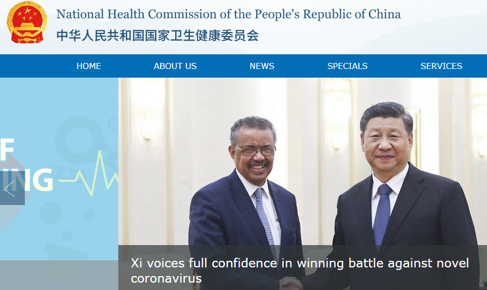
International
As countries and airlines globally restrict travel to Wuhan and China, the Reuters news agency has compiled an extensive summary of steps taken by airlines in response to the coronavirus outbreak. Read the full list here
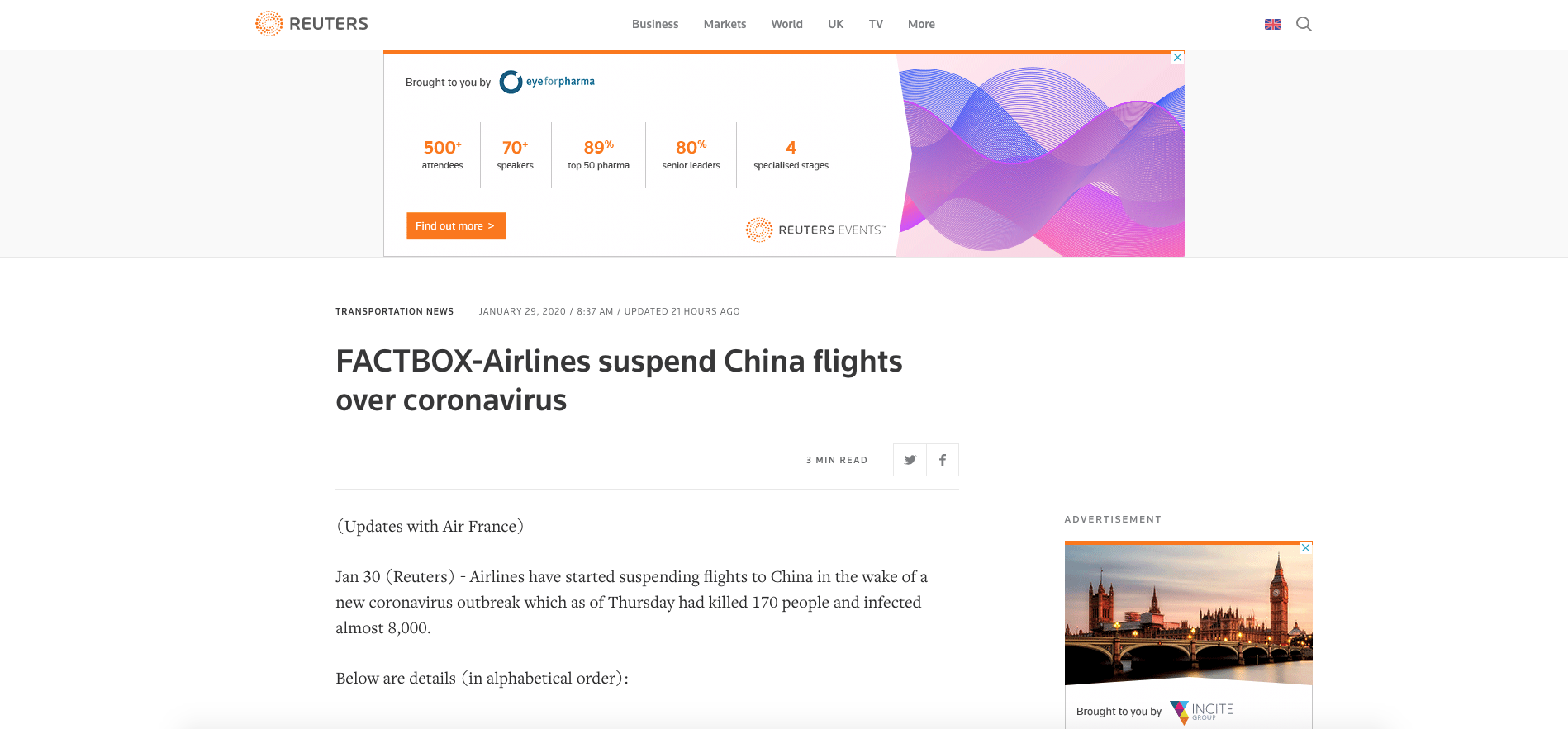
China (Hong Kong)
Cathay Pacific and Cathay Dragon have suspended inflight duty free sales on flights to and from Mainland China with immediate effect.
The Cathay Pacific Group added that the meal service in first and business class will comprise a single tray with appetiser, main course and dessert served together, with trolley services suspended after the meal. Passengers in economy class will be served a disposable snack bag including a hot handheld snack and other items.
Amenities including hot towels, pillows, blankets and magazines will also not be offered to any passengers.
“This modified service offering is strictly a temporary measure designed to further strengthen our health and safety protocols in light of the evolving situation regarding coronavirus cases in Mainland China. These changes will enable us to provide enhanced protection for our customers and crew while at the same time continuing to deliver a satisfactory inflight experience for passengers,” the airline said in a statement.
UK
The first two cases have been confirmed in the UK. In a statement, England’s Chief Medical Officer Chris Whitty said: “We can confirm that two patients in England, who are members of the same family, have tested positive for coronavirus. The patients are receiving specialist NHS care, and we are using tried and tested infection control procedures to prevent further spread of the virus.”
US
The US Department of State last night issued a Level 4 (‘Do not travel’) Travel Advisory relating to China.
“Do not travel to China due to novel coronavirus first identified in Wuhan, China. On January 30, the World Health Organization has determined the rapidly spreading outbreak constitutes a Public Health Emergency of International Concern. Travellers should be prepared for travel restrictions to be put into effect with little or no advance notice. Commercial carriers have reduced or suspended routes to and from China,” the advisory read.

The US action seems to fly in the face of the World Health Organization’s (WHO) recommendations, contained in its statement last night. The WHO said: “The Committee acknowledged that, in general, evidence has shown that restricting the movement of people and goods during public health emergencies may be ineffective and may divert resources from other interventions. Further, restrictions may interrupt needed aid and technical support, may disrupt businesses, and may have negative effects on the economies of countries affected by the emergencies.
“However, in certain specific circumstances, measures that restrict the movement of people may prove temporarily useful, such as in settings with limited response capacities and capabilities, or where there is high intensity of transmission among vulnerable populations.
“In such situations, countries should perform risk and cost-benefit analyses before implementing such restrictions to assess whether the benefits would outweigh the drawbacks. Countries must inform WHO about any travel measures taken, as required by the IHR. Countries are cautioned against actions that promote stigma or discrimination, in line with the principles of Article 3 of the IHR.”
“There is no reason for measures that unnecessarily interfere with intl. travel & trade.
We call on all countries to implement decisions that are evidence-based & consistent. WHO stands ready to provide advice to any country that is considering which measures to take”-@DrTedros— World Health Organization (WHO) (@WHO) January 30, 2020
30 January

International
The Emergency Committee of the World Health Organization held today agreed that the novel coronavirus outbreak now meets the criteria for a Public Health Emergency of International Concern (PHEIC).
The Committee emphasised that the declaration of a PHEIC “should be seen in the spirit of support and appreciation for China, its people, and the actions China has taken on the frontlines of this outbreak, with transparency, and, it is to be hoped, with success”.
In line with the need for global solidarity, the committee felt that a global coordinated effort is needed to enhance preparedness in other regions of the world that may need additional support for that.
China/International
The offshore renminbi dropped below the 7 RMB to the dollar mark for the first time this year today, returning to similar levels witnessed in early to mid-December, writes The Moodie Davitt Report Senior Retail and Commercial Analyst Min Yong Jung.
Investors are positioning themselves ahead of the World Health Organization’s likely decision (expected tonight Switzerland time) to declare the latest outbreak an international public health emergency. News of the fast-paced spread of the virus has deterred investors from buying the Chinese Yuan.
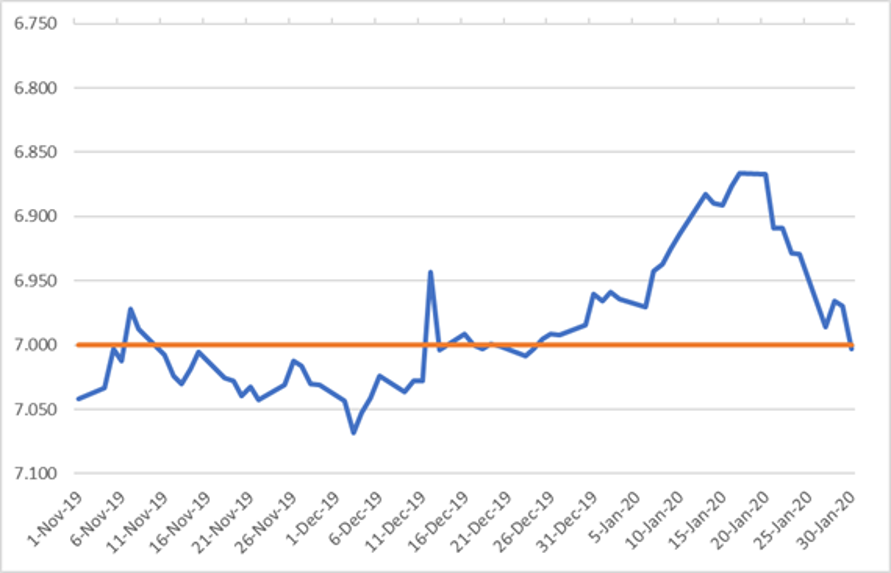
Meanwhile, Taiwanese traders have returned to action following time off from the Chinese New Year holiday. Financial markets in Taiwan have been closed since 20 January and traders were actively selling in today’s trading session, resulting in the steepest one-day fall of the benchmark index, which slumped -5.75%.
The electronics sector underperformed the index, declining -5.99%, with investors anticipating production disruption as a result of the coronavirus.
International
Tax Free World Association President Alain Maingreaud says the coronavirus outbreak is having a “significant short-term impact” but he is hopeful of a rapid return to normal trading conditions once it is contained.
In a statement, Maingreaud also highlighted the resilience of the travel retail industry when presented with such challenges, and said that preparations for upcoming events – including TFWA Asia Pacific, which was cancelled in 2003 as the SARS crisis deepened – continue as normal.
Maingreaud’s full statement reads: “The situation in China is a cause for great concern, both at a business level, but of course most importantly on a personal level for those who have been affected by the coronavirus outbreak.
“Preparations for our future events, including TFWA Asia Pacific Exhibition & Conference, continue”
“An issue that affects China, one of the most important markets in our industry, will clearly have an impact across the business. Our colleagues in China and those catering for Chinese travellers around the world are trading in very difficult circumstances and we stand with our industry colleagues.

“The resilience of our industry has been tested many times, and while this outbreak is clearly having a significant short-term impact, we remain hopeful of a rapid return to normal trading conditions once the outbreak is under control. We must be optimistic that, given the resources available, the relevant authorities will find ways to contain the virus.
“We are working closely with other trade bodies and our business partners to review the situation on a daily basis, and in the meantime preparations for our future events, including TFWA Asia Pacific Exhibition & Conference, continue.”
Italy
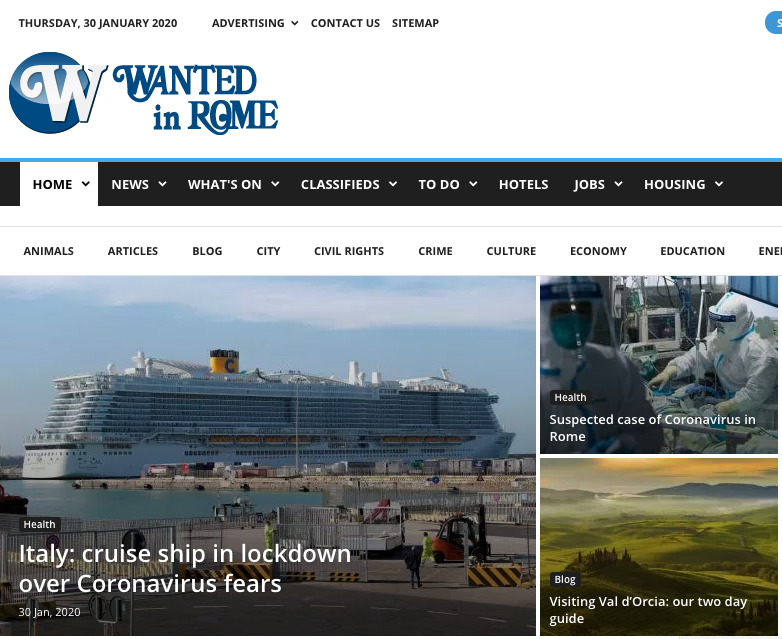
Over 6,000 passengers and 1,000 crew members are being held in port onboard the Costa Smeralda on fears that a 54-year-old woman from Macau and her travelling companion have the coronavirus. The vessel and its passengers are in Civitavecchia port, a coastal town northwest of Rome.
International
The World Health Organization (WHO) is once again meeting to decide whether to declare the outbreak an emergency of international concern. After a two-day deliberation last week, the WHO stopped short of making the declaration but emphasised the fluidity of the situation.
Philippines
The first case in the Philippines has been announced by the World Health Organization.
The Department of Health today announced the first confirmed case of the 2019 novel #coronavirus in the Philippines. The patient is 38-years-old from China. pic.twitter.com/0qh7TMMMV8
— World Health Organization Philippines (@WHOPhilippines) January 30, 2020
India
The country’s first confirmed case of novel coronavirus has been reported. The patient, a student of the Wuhan University, is stable and in isolation at a hospital in Kerala, the Health Ministry said. [Source: Economic Times]
China
While China has over 7,700 confirmed cases, there are only 68 cases in other countries, less than 1 percent of the total reported worldwide, Global Times noted, citing an expert from government agency, the Centers for Disease Control and Prevention.
In an encouraging development, the Wuhan Institute of Virology under the Chinese Academy of Science has listed some medicines that can effectively curb the novel coronavirus at cellular level. Results have been provided to the Hubei provincial headquarters, which is leading the battle against the virus.
Any medical breakthroughs can’t come soon enough. As of 07:47 Beijing time, 7,711 cases of novel coronavirus had been confirmed in China, with 170 deaths. 124 patients have recovered. [Source: Global Times]

Finland
The coronavirus outbreak has spread to Finland with the first confirmed case. Finnish media Uutiset said that the individual is a Chinese tourist from Wuhan. The 32-year-old woman is being treated in Lapland Central Hospital in Rovaniemi.
29 January
China
The number of confirmed cases of novel coronavirus had reached 6,078 nationwide as at 18:00. Among those, 132 have died and 115 have been discharged from hospitals. [Source: Global Times, Xinhua]
International
LVMH Moët Hennessy Louis Vuitton CFO Jean-Jacques Guiony was asked about the impact of the coronavirus outbreak on the company during the earnings call for the luxury products group’s financial results for 2019.
Guiony emphasised that, while it is too early to assess the outbreak’s impact on business, it was important to “analyse the situation calmly” and “not panic”.
LVMH’s teams in China, Guiony continued, have reported that the virus does not appear to be as aggressive as SARS and that the Chinese government has reacted “very strongly” to the outbreak. He added that the LVMH teams in China were predicting the situation to be partially resolved during March or towards the end of March.
“If it lasts a couple of months, or if it’s resolved over the next two, two and a half months, then it won’t be that bad… if it were to last two years, it would be a totally different matter,” Guiony added.
South Korea
There has been a quiet atmosphere in South Korean duty free stores today – a world away from the usual scenes of hustle and bustle in the industry’s largest market. However, on this occasion at least, the coronavirus was not to blame; it is the Lunar New Year.

The Lunar New Year festive period typically results in a -20% week-on-week decline in sales in South Korea’s duty free market with resellers back in China to enjoy time off with family and relatives. Lotte Duty Free confirmed that the Lunar New Year period is yielding a similar performance this year.
The decision to extend the holiday period to 3 February is keeping resellers away from Korean duty free stores for longer.
The continued suspension of packaged tours to Korea will also affect the duty free market and the impact will be felt more severely than before, according to The Moodie Davitt Report’s Senior Retail and Commercial Analyst Min Yong Jung. Read his analysis here.
International
GlobalData has added a note of caution to its estimate for airport sales in 2020.
The data analytics company has estimated global airport retail sales will reach US$48.2 billion in 2020, a +6.1% year-on-year increase.
Adding a note of caution, GlobalData Principal Analyst Honor Strachan said: “The prevention of travel for Chinese consumers will impact the performance of airport retail worldwide. Over the last few years airport retailers, especially those in Europe, have tailored their propositions, integrated Chinese payment solutions and invested in Mandarin-speaking staff to target Chinese passengers and maximise sales growth opportunities.”
GlobalData is forecasting Asia Pacific will contribute 45.1% of global airport sales this year, with sales in the region rising +8.4% year-on-year to US$21.7 billion.
“If outbound tourism from China suffers as a result of the coronavirus, airport operators and retailers must adapt their strategies to target other passengers,” Strachan added.
China (Macau)
Visitor numbers have collapsed, plummeting -69% in the first four days of the Lunar New Year festive period. Arrivals from the Mainland were down by over -75%. Travel retailers, such as DFS, and the closely related gaming, hotel and restaurant sectors, are all reeling from the downturn [Source: Macau Daily Times]
DFS declined to comment but it is understood that its stores are still open, in close discussion with the respective landlords. Like all affected travel retailers, DFS will be working hard to protect its staff and customers.
China yesterday announced a temporary suspension of the Individual Visitor Scheme (IVS) to Macau. Sources say that 47% of Mainland visitors to Macau arrived on IVS last year. With the group tour business already suspended, that has immediate and stark repercussions for Macau’s economy.

With China Duty Free Group forced to close its doors at the CDF Mall in Haitang Bay last Sunday; and DFS Group’s modern-day commercial heartland of Macau set to grind to a near or actual halt, these are grim days for the travel retail community. Hong Kong, already suffering from the effect of sustained social unrest, will be further affected by the closure of the main borders with Mainland China from tomorrow.
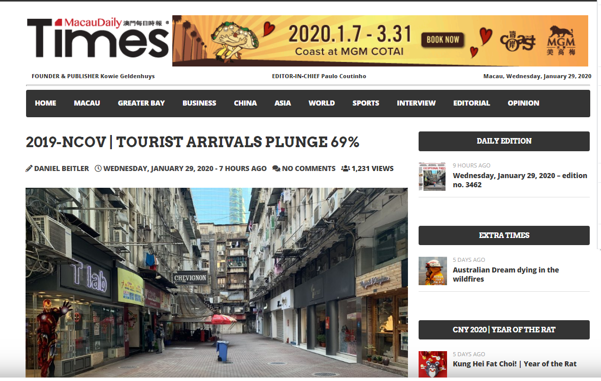
UAE
The first cases in the Middle East have been confirmed, with the Ministry of Health & Protection in the UAE announcing that a family of four has been infected. The statement added that the general health situation “is not a cause for concern” and that the Ministry advises “all citizens and residents to adhere to the general health guidelines”.
The general health situation is not a cause of conecrn
The first case of coronavirus was diagnosed in Chinese citizens from Wuhan city, China. Meanwhile, the health condition of those infected is stable and under medical observation. pic.twitter.com/1w7sGu1tIH
— وزارة الصحة ووقاية المجتمع الإماراتية – MOHAP UAE (@mohapuae) January 29, 2020
International
The next few weeks will be critical in determining the extent of the spread of the coronavirus from heightened travel during Lunar New Year.
The Moodie Davitt Report’s Senior Retail and Commercial Analyst Min Yong Jung has written an insightful analysis of the potential impact of holiday travel, using South Korea as a case study, in an article you can read here.
India
The Ministry of Health is advising travellers to refrain from travelling to China.
New updated travel advisory for Novel #coronavirus:
Travellers are advised to REFRAIN from travelling to #China.#nCoV2020 @PMOIndia @drharshvardhan @AshwiniKChoubey @PIB_India @DDNewslive @airnewsalerts @MEAIndia @MoCA_GoI pic.twitter.com/8hRruhxcSC
— Ministry of Health (@MoHFW_INDIA) January 29, 2020
UK
British Airways has suspended flights to and from Mainland China as the coronavirus outbreak worsens. This comes as the UK Foreign & Commonwealth Office advised against all travel to Hubei Province and all but essential travel to the rest of Mainland China.
China
China is likely to have a vaccine for the novel coronavirus for public use within three months. That will include a month and a half of development and a similar period of testing, according to Li Lanjuan, an academician of the Chinese Academy of Engineering, Global Times reports.
1,459 new cases of coronavirus and 3,248 suspected cases, including one in Tibet, were reported across China yesterday alone as the spread of the virus accelerates. The total number of confirmed infections reached 5,974, with 1,239 patients in critical condition. The death toll has reached 132 while 103 patients have recovered. [Source: Global Times]
China/International
As Chinese shoppers alter their travel plans and stay at home to avoid infection, many luxury market players — including luxury groups, Chinese brands, and ecommerce companies — have decided to make generous contributions, writes The Moodie Davitt Report business information partner Jing Daily.
International luxury group LVMH announced on 27 January 27 that it would donate nearly US$2.3 million (RMB16 million)to the Chinese Red Cross Foundation to help with a medical supplies shortage in Wuhan. The group also helped to gather much-needed supplies for China from France and throughout Europe with the assistance of the Red Cross. This news was shared by many LVMH employees in China and garnered positive reactions from fashion insiders.

LVMH’s rival luxury group Kering posted a donation of US$1.1 million to the Red Cross in the heavily impacted province of Hubei. The donation will be used for front-line prevention and control work (including care for hospital medical staff and patients) as well as training and public health education. International beauty groups L’Oréal and The Estée Lauder Companies pledged US$720,000 and US$300,000 respectively to help China fight the virus.
Beauty brand Perfect Diary is broadcasting safety recommendations, and intimate wear company Neiwai posted a message reminding its fans to stay healthy and strong on WeChat.
From big donations to small messages, brands chose to be sensitive to their consumers during this crisis rather than push out promotional messages. “I personally find it tone-deaf to push coupons or remain silent during these times of crisis,” said Dao Nguyen, founder of Essenzia, a consultancy for beauty and fragrance marketing strategy in China. “I am not sure if this is a lack of awareness or reactivity?”
In return, fans responded positively to brands’ heartfelt messages. “What Perfect Diary did is quite moving, they are the first brand I saw publish any safety guide for their fans,” commented one WeChat user named Aaliyah. “No wonder Estée Lauder is my favourite brand,” wrote Annabelle Du under the group’s donation announcement.
These are the kinds of organic, positive impressions that can’t be bought with a marketing budget or advertising money.
International
A scientific race to find a vaccine for the virus is underway, writes The Moodie Davitt Report Senior Research & Commercial Analyst Min Jon Jung. Here is a roundup of key breakthroughs so far.
January 10: Chinese scientists posted a complete genome of the coronavirus.
January 28: Hong Kong University Professor Yuen Kwok-yung was successful in producing a vaccine but testing on animals will take months and clinical trials at least another year.
January 29: Peter Doherty Institute for Infection and Immunity in Australia successful in recreating virus outside of China.
The joint global effort may help to shorten the time required to develop a successful vaccine, but the development is both expensive and time-consuming. The vaccine for the SARS virus was developed 20 months after the viral genome was released and the outbreak was contained with public health measures before the vaccine was ready.
Dr Paul Stoffels, Johnson & Johnson’s chief scientific officer, estimated it could take eight to 12 months before his company’s vaccines reach human clinical trials.
28 January
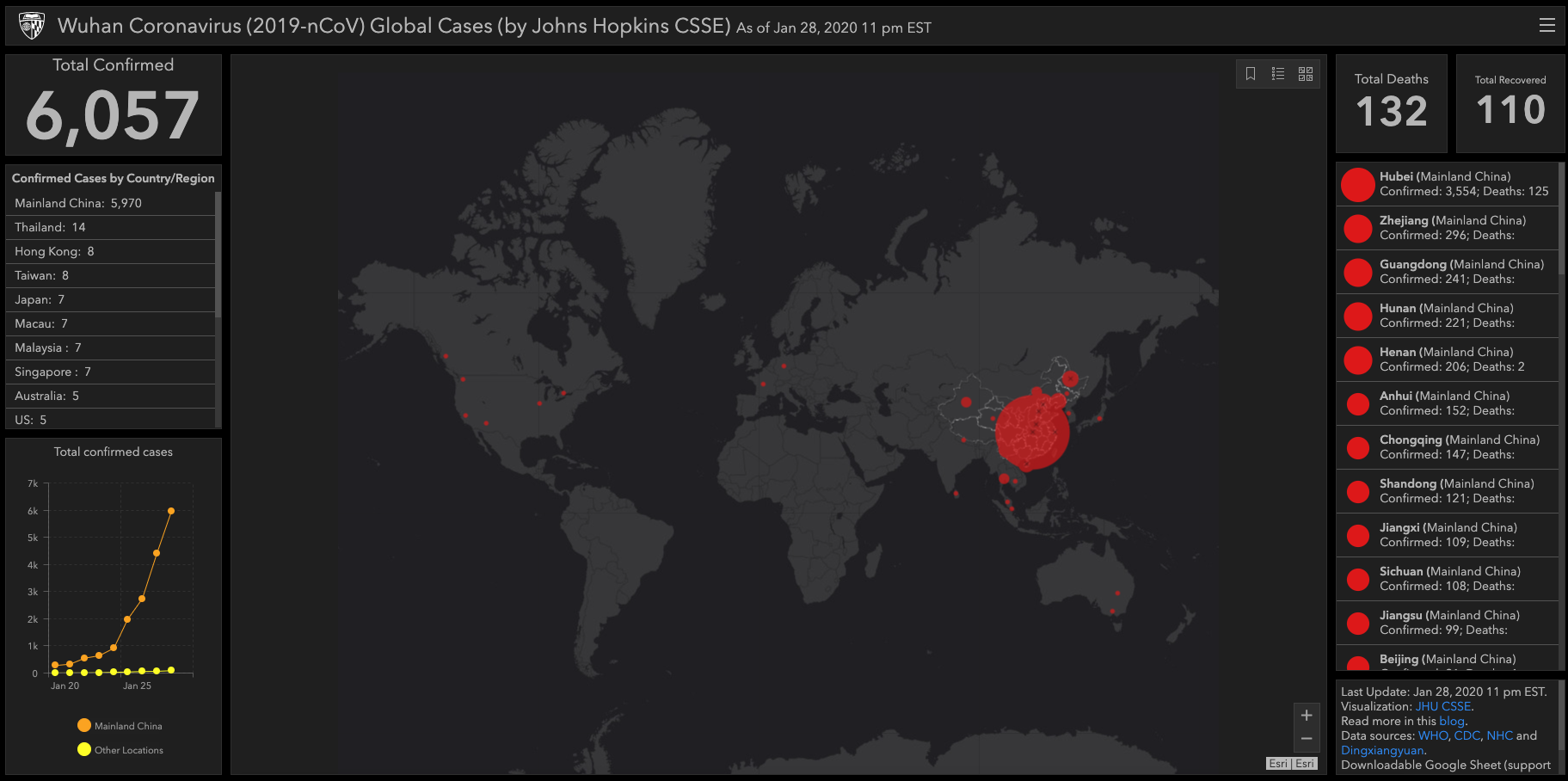
China (Macau)
In a big blow to travel retailers, the government today announced a temporary suspension of the Individual Visitor Scheme (IVS) to Macau. Sources say that 47% of Mainland visitors to Macau arrived on IVS last year. The FIT business is crucial to both the gaming and travel retail sectors.
China
The Director-General of the World Health Organization (WHO), Dr Tedros Adhanom Ghebreyesus, today met President Xi Jinping of the People’s Republic of China in Beijing. They shared the latest information on the novel coronavirus 2019 (2019-nCoV) outbreak and reiterated their commitment to bring it under control.
The death toll in China has risen to 106, with 4,535 reported cases of the virus.

UK
The Foreign Office has warned Britons not to travel to Mainland China, unless their journey is essential.
Thailand
King Power International has taken steps to reassure customers that it is minimising the risk of infection from the coronavirus.
With so many Chinese tourists at the retailer’s airport and downtown stores, some shoppers have expressed concern at the risk of infection. But King Power has taken to Twitter to explain that it has been spraying its stores to kill virus particles. In addition, all public-facing staff are required to wear masks, principally to protect them from exposure. The retailer is also encouraging all customers to wear masks.
King Power has added service points where customers can use hand-washing gels and is ensuring that beauty testers are being regularly sprayed with alcohol and wiped with clean tissue paper.
Click here to read the full story.
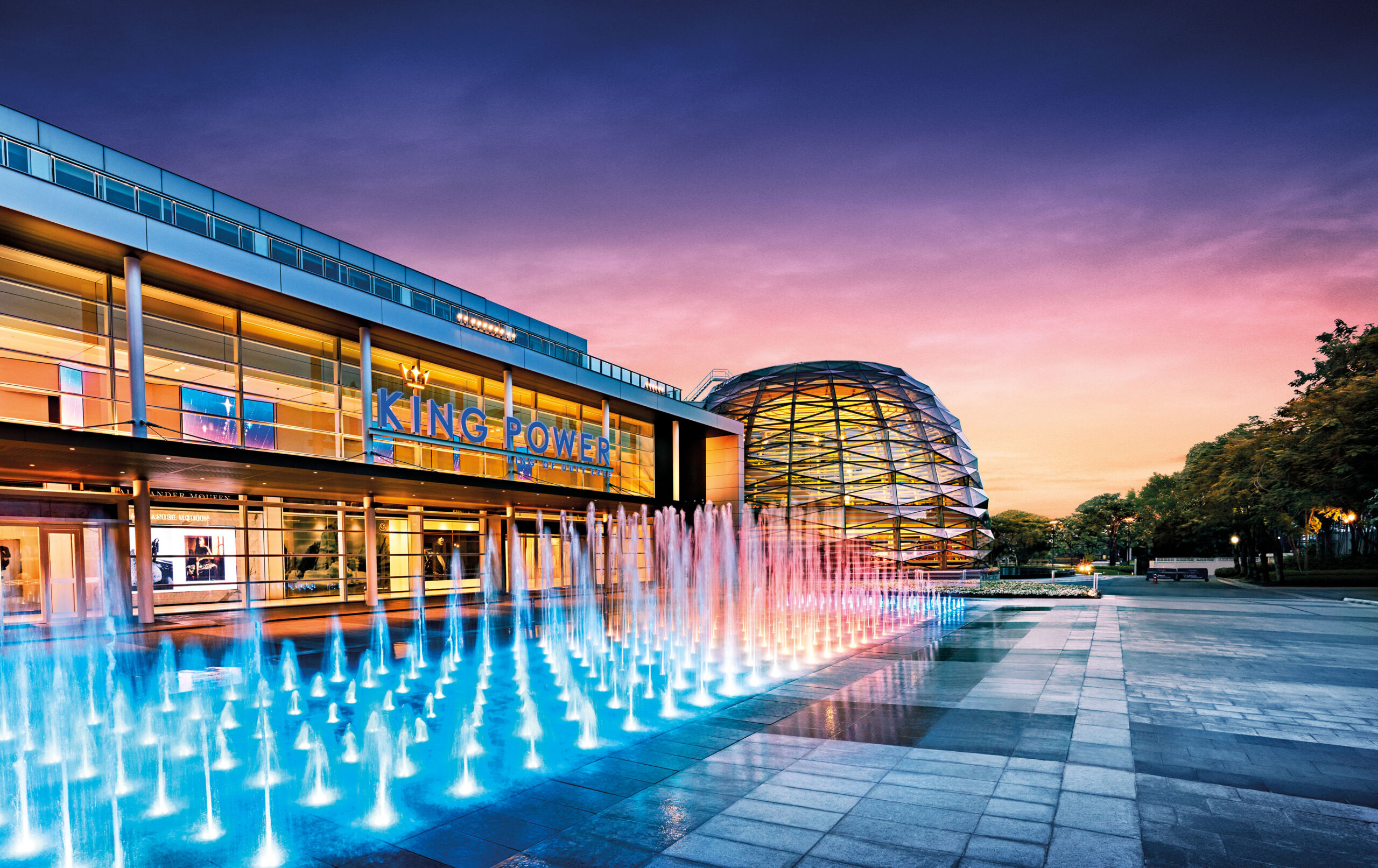
International
In the wake of the coronavirus outbreak, our Senior Editor Liam Coleman has looked at the travel retail industry’s traditional strength in dealing with global crises,
“There’s no doubt that travel retail will be hit hard – in terms of passenger numbers, sales and investor confidence – over the coming weeks. Yet if history offers us consolation, it is this: once the worst is over, the bounce back is likely to be swift, strong and sustained,” he says.
Read the full piece with supporting analysis by Generation Research here.
China (Hong Kong)
A number of Hong Kong’s borders with Mainland China will close temporarily from 30 January, Reuters is reporting.
The four land border crossings between the city and the mainland will be suspended, Hong Kong Chief Executive Carrie Lam said. That includes the West Kowloon Station, where Dufry recently secured a concession to operate stores.
Lam added that flights from the mainland to Hong Kong will decrease by -50%, all cross-border ferry services will be stopped and that cross-boundary coach services on the Hong Kong-Zhuhai-Macau Bridge will be suspended.
China (Hainan Island)
China Duty Free Group (CDFG) staff in Hainan are safe and well, a company spokesperson told The Moodie Davitt Report today. As reported, China’s travel retail giant closed its acclaimed CDF Mall in Haitang Bay in Sanya, Hainan Island on Sunday in response to the worsening Wuhan coronavirus outbreak.
CDF Mall is one of Asia’s and the world’s most important duty free locations, generating the lion’s share of the CNY13.61 billion (US$1.98 billion) in sales on the island last year – a whopping +35% year-on-year increase. CDFG has also closed its airport stores at Xi’an Xianyang International and Hangzhou Xiaoshan International airports.
“In order to protect the safety of passengers and staff, the Haitang Bay store and some domestic duty free shops have been closed,” the spokesman said. “The personnel of CDFG are safe at present, please rest assured.”
Japan
Over 20,000 of tour company Kamone’s Chinese package tour customers have so far pulled the plug on all trips to Japan up to 10 February, CNN reported.
China announced a ban on outbound group travel on Sunday.

China
China’s death toll from the coronavirus outbreak has soared to 106. The number of confirmed cases in the country has climbed to around 4,500. 26 new deaths were reported on Tuesday. [Source: South China Morning Post]
South Korea
Leading travel retailer Lotte Duty Free, whose business is hugely reliant on Chinese visitors, has taken action to ensure the safety of customers and staff in the face of the coronavirus threat with a series of emergency measures at its stores.
The company has set up an emergency response committee, chaired by CEO Lee Kap, to minimise the risk of the outbreak spreading.
Lotte Duty Free will check all employees for fever daily; it will make masks mandatory for store staff and available for customers; ensure regular disinfection of the stores; and expand the number of hand sanitisers available in its stores. Special leave is also permitted for staff who are pregnant or have underlying illness conditions.
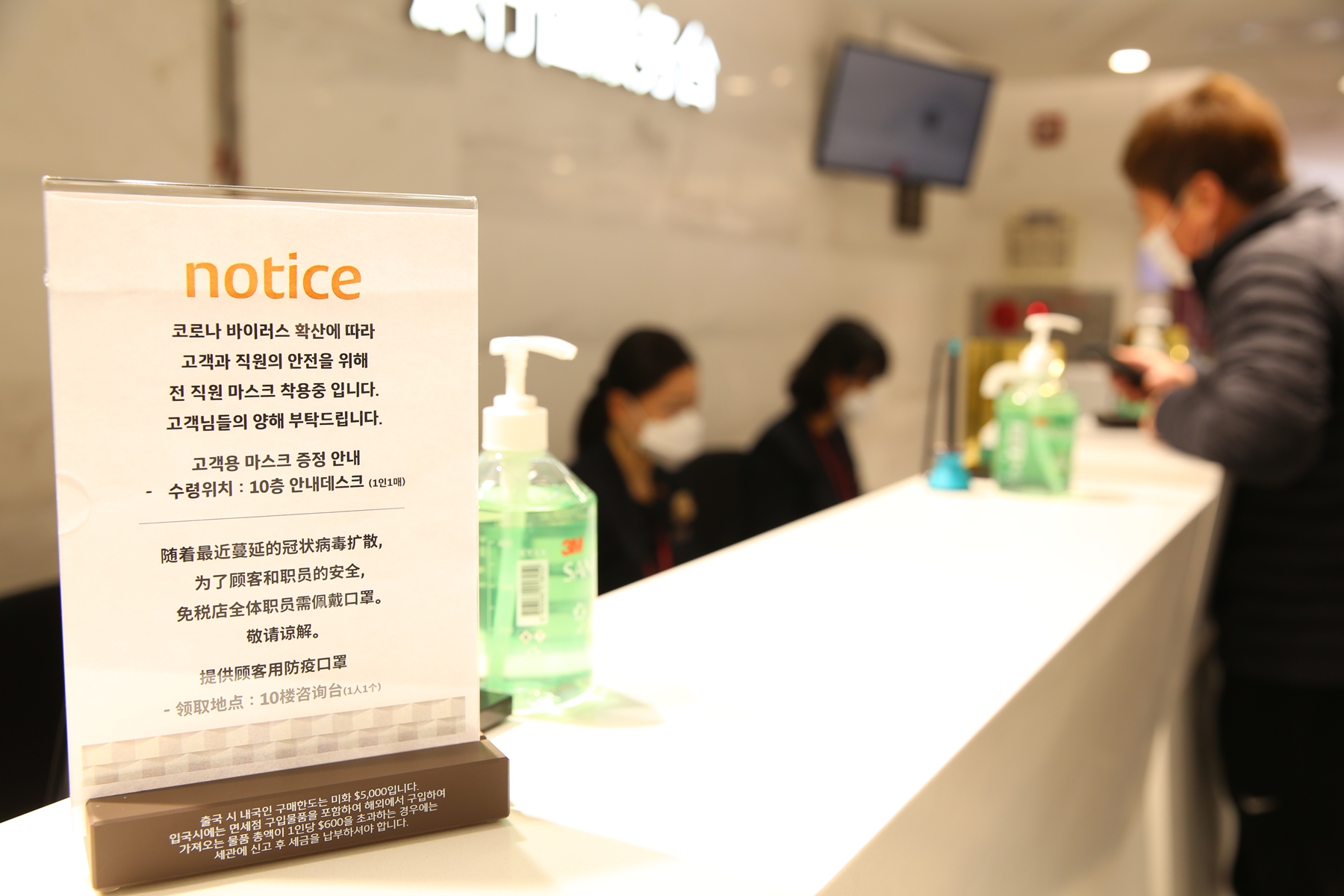
Lee Kap said: “Lotte Duty Free plans to take prompt and additional countermeasures, with the highest priority on customer and employee safety.
“We will continue our response through close cooperation with relevant organisations such as the Korea Centers for Disease Control and Prevention, Incheon International Airport Corporation and Korea Airports Corporation.”

27 January

Turkey
Turkey has become the latest country to advise its citizens against non-compulsory travel to China. “It is highly recommended that our citizens do not travel to China unless it is compulsory, and if they travel to China, they should stay away from the regions where the incidents are intense, especially in Hubei Province,” a statement from the Turkish Ministry of Foreign Affairs said.
China (Hainan Island)
China Duty Free Group (CDFG) has closed its acclaimed CDF Mall in Haitang Bay in Sanya, Hainan Island in response to the worsening Wuhan coronavirus outbreak.
The popular resort island, birthplace of China’s ‘offshore duty free’ sector, has so far reported 33 confirmed cases, 11 of them in Sanya.
The CDF Mall is one of Asia’s and the world’s most important duty free locations, generating the lion’s share of the CNY13.61 billion (US$1.98 billion) in sales on the island last year – a whopping +35% year-on-year increase.
CDFG said: “Due to epidemic prevention and control, and the need to reduce the concentration of the population and its risk of pathogen transmission, China Duty Free Sanya Duty Free Shop will temporarily close from 4pm today [Sunday 26 January]. The re-opening of the store will be notified in due course, according to the government’s requirements in terms of epidemic prevention and control.”
CDFG pledged to “fully support customers with product refunds” where necessary due to any changes in travel arrangements. It recommended that customers use the official CDFG Sanya Mall online shop during the main store’s closure.
Click here for more analysis on the store closure
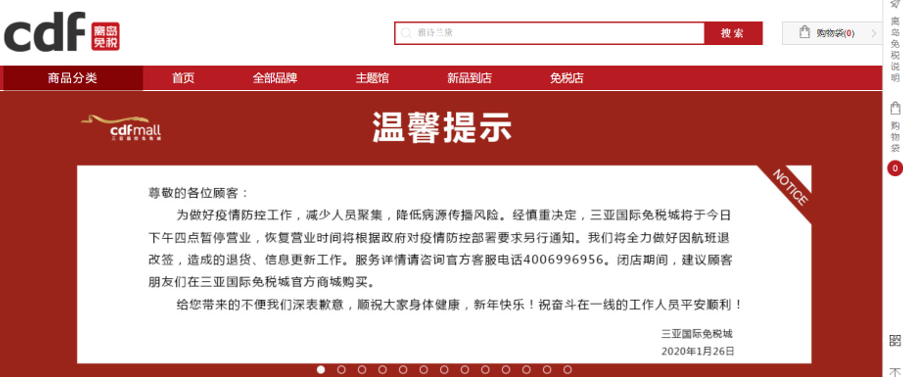
For our earlier updates, click here.












